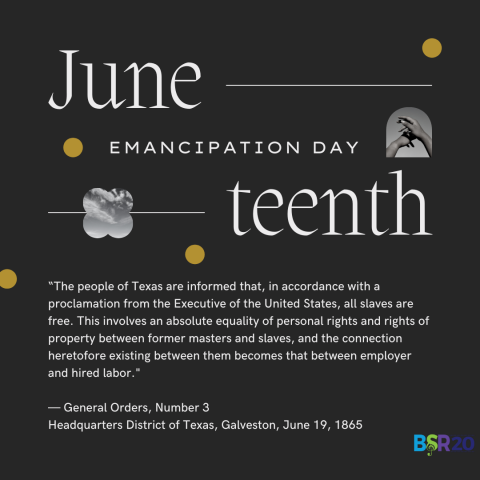A statement from BSR on Juneteenth

Juneteenth commemorates the end of slavery in the United States, marking the date that the emancipation of enslaved people was announced in Galveston, Texas in 1865. This was more than two years after the Emancipation Proclamation, and actual emancipation was delayed even longer by slave owners who held off on announcing the news. The following year on June 19 in Texas was the first celebration of what we now called Juneteenth.
That celebration spread beyond Texas, and more than 150 years later it is a recognized state holiday in most of the US, with Massachusetts having made it official in 2020. In recent days the federal government has moved to make this a federal holiday. The acknowledgement of Juneteenth as a government holiday is not enough to make up for the suffering the Black community has endured. The recent attention paid to this holiday by white Americans risks diverting attention from the focus of this day: freedom and opportunity for Black Americans.
This Juneteenth, BSR joins in and encourages celebration of Black joy and liberation. Art and creativity are among the ways that people find freedom, and we lift up those initiatives in our communities that allow the full flourishing of each person.
Too often white New Englanders eschew responsibility for systematic racism, claiming that it is a problem that occurs only in the South. At BSR we acknowledge that New England and Boston benefitted from slavery financially and we seek to eradicate the insidious racism that is pervasive in our local classical music community. We realize the ways past harms have made it harder for Black artists to thrive - and sometimes even to survive - and let that awareness inform our future actions. Black and brown people are negatively impacted by systemic racism, which results in police brutality, injustice in the criminal justice system, and unpunished violence; we state unequivocally that Black Lives Matter.
Boston and surrounding cities and towns have vibrant communities including Caribbean populations, recent African immigrants, and Black families with deep roots in the United States. These highlight the diversity within the African diaspora and our region and its artistic life are enhanced by these rich cultural traditions. We recommit ourselves today to the goals of our cultural equity statement, with a particular focus on those which may help bring more Black joy to our world.
